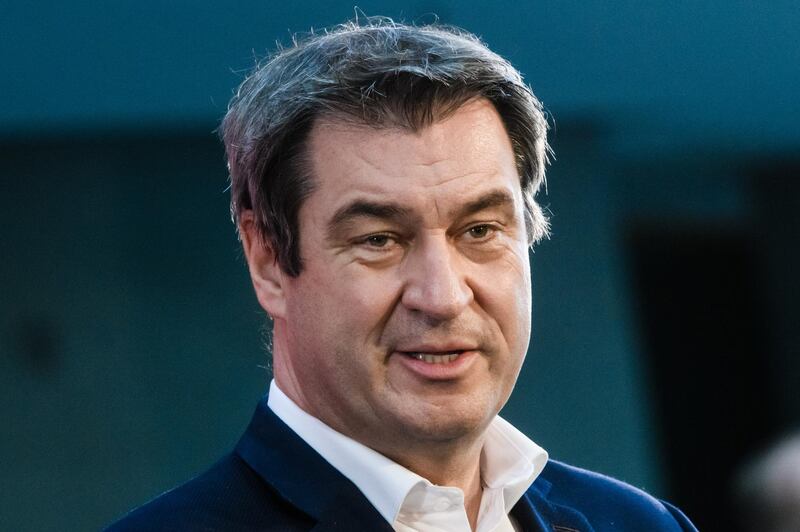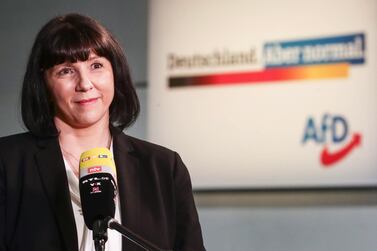Germany is poised for a battle between two candidates to succeed Angela Merkel after the minister-president of Bavaria shook up the race by announcing he wanted to become the next chancellor.
Markus Soeder ended months of speculation by confirming on Sunday that he would seek to succeed Mrs Merkel and lead the conservative bloc into September's election.
He is the leader of the CSU, the Bavarian sister party to Mrs Merkel's Christian Democratic Union, but the two parties invariably field a joint candidate for the chancellorship.
It sets up a contest between Mr Soeder, 54, and CDU chairman Armin Laschet, 60, an ally of Mrs Merkel who was elected party leader in January but is behind Mr Soeder in opinion polls.
Mrs Merkel, 66, is bowing out after 16 years in office and has not taken sides in the succession race.
Mr Soeder said on Sunday he was ready to run "if the CDU – which is the bigger sister, that's very clear – supports this broadly".
Senior figures in the CDU and CSU were meeting separately on Monday as the bloc moves closer to a decision.
If the CDU formally chooses Mr Laschet and the Bavarian party declines to support him, the bloc's 245 members of parliament could have the final word as early as Tuesday.
The CDU's Berlin branch broke ranks by announcing its support for Mr Soeder, calling him a successful crisis manager who could lead Germany out of the coronavirus pandemic.
Only twice, in 1980 and 2002, has the Bavarian party provided the nominee for the joint CDU-CSU ticket. Both candidates lost the election.
Mrs Merkel was the CDU leader in 2002 but agreed to stand aside that year in favour of the CSU's Edmund Stoiber, before running successfully for the chancellorship in 2005.
The CDU/CSU's parliamentary leader Ralph Brinkhaus told ARD television that he wanted a decision to be made this week so that the parties could forge ahead with their election campaign.
Peter Altmaier, the CDU Economy Minister and another ally of Mrs Merkel, suggested the process could take longer, and said he hoped for a "really good solution in the next eight to 10 days".
The CDU/CSU bloc's poll ratings have declined sharply in recent weeks and it suffered poor results in two regional elections last month amid criticism of Mrs Merkel's handling of the pandemic.
Germany has been slower than countries, including Britain and the US, in vaccinating its population. New social restrictions are in place to combat a third wave of Covid-19 cases.
Mr Soeder said the candidate should be the one with the best chances in the September 26 election, highlighting his superior rating in opinion polls.
While Mr Soeder was a fierce critic of Mrs Merkel over her handling of the 2015 refugee crisis, he has supported her push for restrictions during the pandemic.
Mr Laschet, meanwhile, was criticised by Mrs Merkel for a lax response in the state of North Rhine-Westphalia, where he has governed since 2017.
Mr Soeder said on Sunday that "whatever the decision turns out to be, we will work very well personally together".
“We determined that both of us are suitable and both of us are ready,” he said.
Mr Laschet said the goal was to “foster as much unity between the CDU and CSU as possible”.
“There’s a lot at stake. Europe is watching how Germany develops,” he said.
National polls put support for the CDU-CSU at between 26 per cent and 28 per cent, compared with almost 33 per cent of the vote at the last election in 2017.
However, the bloc is still on course to take first place ahead of the environmentalist Greens and the centre-left Social Democrats.
The Greens plan to announce on April 19 which of the party’s two co-leaders will make its first serious bid for the chancellery.
The Social Democrats, Mrs Merkel’s current coalition partners, nominated Finance Minister Olaf Scholz as their candidate months ago.








